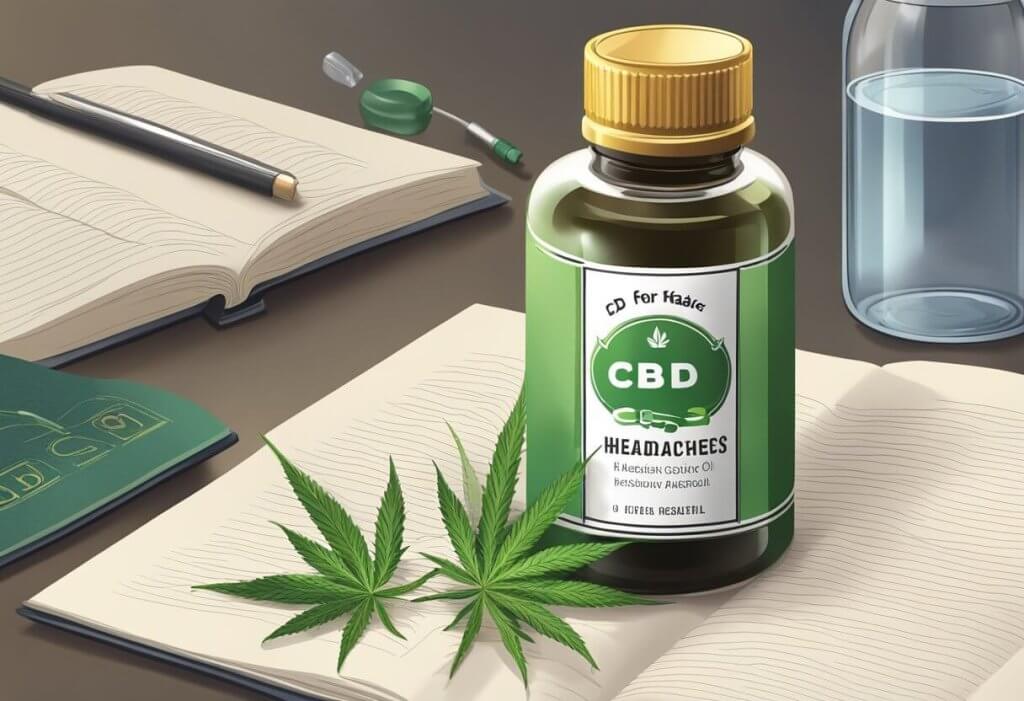CBD for Headaches: Quick Relief or Hype?
Disclaimer: The anecdotal benefits of CBD mentioned on this website are based on preliminary research and individual user experiences. All information presented here is not meant to substitute for or replace information from health care practitioners. Please click here for our full disclaimer, including side effects, FTC position, etc.
Millions of people suffer from headaches, and many are turning to CBD as a potential natural remedy for relief.

If you’re one of the countless individuals who experience headaches, you know how debilitating they can be. From tension headaches to migraines, these painful episodes can disrupt your daily life, leaving you searching for effective solutions. While traditional pain medications may provide temporary relief, they often come with unwanted side effects and the risk of dependency. This has led many people to explore natural alternatives, such as CBD, for managing their headaches.
CBD, or cannabidiol, is a non-psychoactive compound found in the cannabis plant that has gained significant attention for its potential health benefits. Research suggests that CBD may offer a range of therapeutic properties, including pain relief, anti-inflammatory effects, and stress reduction. As more people discover the potential CBD benefits, it’s no surprise that CBD has become a popular choice for those seeking a natural approach to headache management.
Whether you’re looking for an alternative to conventional treatments or simply curious about the benefits of CBD, read on to discover how this natural compound may offer hope for those struggling with headaches.
Key Takeaways
- CBD is explored for its potential in relieving headache pain without the psychoactive effects of THC.
- Anecdotal evidence suggests CBD may reduce the severity of headaches, promoting a better quality of life.
- Ongoing research is crucial to substantiate CBD’s effectiveness for headache relief and clarify best usage.
Understanding CBD and its Role in Treating Headaches

Cannabidiol (CBD) has become a popular topic for its potential in providing relief for various types of pain, including headaches. This section explores what CBD is and how it may be beneficial for those experiencing headache pain.
| Headache Type | Potential Benefits of CBD |
|---|---|
| Migraine | Reduces frequency, pain intensity |
| Tension Headache | Muscle relaxant effects |
| Cluster Headache | Anti-inflammatory properties may help |
| Medication Overuse Headache | May break medication overuse cycle |
What Is CBD?
CBD is a compound found in the cannabis plant. Unlike its cousin tetrahydrocannabinol (THC), CBD does not produce a “high.”
Instead, it is often extracted from hemp, a type of cannabis plant with low THC levels, making it legal under federal law if it contains less than 0.3% THC.
CBD is available in several forms, including oils, capsules, creams, and edibles. The body’s endocannabinoid system, which includes cannabinoid receptors, interacts with cannabinoids like CBD, which can regulate pain and inflammation.
Fact: CBD has been found to have analgesic and anti-inflammatory effects, which may help reduce headache and migraine pain.
https://www.ncbi.nlm.nih.gov/pmc/articles/PMC7204604/
How CBD May Help with Headache Pain
Research on CBD’s effectiveness is still in the early stages, but studies and anecdotal evidence suggest that CBD may help reduce the frequency and intensity of headaches, including migraines.
This is thought to occur through CBD’s interaction with the body’s endocannabinoid system to reduce inflammation and alter pain signals.
CBD oil, specifically, is a form that people often use for chronic pain management. However, it’s important to note that while CBD may offer relief for some, the safety and potential side effects, particularly regarding long-term use, require further investigation.
In terms of regulation, the medical cannabis market, which includes CBD products, is often under scrutiny, and consumers should look for high-quality, third-party-tested products for safety assurance.
Practical Information on Using CBD for Headaches

When considering CBD for headaches, it’s important to focus on the quality of CBD products, be aware of potential side effects and interactions, and understand the proper dosages and methods of usage.
Finding Quality CBD Products
Selecting a high-quality CBD product is crucial for safety and effectiveness.
Look for products that provide a Certificate of Analysis (COA), which details the purity and cannabinoid content. Check that the product is federally legal and has been tested for contaminants.
Whether you opt for cannabis-derived CBD oil or hemp-derived CBD, purchasing from a reputable online retailer or dispensary can make a difference.
- Criteria for Quality:
- COA available
- Federally legal (hemp-derived with less than 0.3% THC)
- Tested for contaminants such as pesticides and heavy metals
Potential Side Effects and Interactions
CBD is generally considered safe, but can cause side effects, including fatigue, dry mouth, and changes in appetite. It may also interact with certain prescription medications such as blood thinners.
Therefore, it’s important to speak with a healthcare provider before starting CBD, especially if you’re taking other medications.
CBD may affect the efficacy of migraine medications like triptans, and overuse may lead to medication overuse headaches.
Common Side Effects:
- Fatigue
- Dry mouth
- Nausea
Consult Healthcare Provider for:
- Possible drug interactions
- Guidance on combining CBD with other migraine treatments
Promising Study: A 2017 study found that CBD was effective in reducing migraine frequency over 3 months in 48 patients with chronic migraine.
https://pubmed.ncbi.nlm.nih.gov/28834237/
Guidelines on Dosage and Usage
Determining the proper dosage of CBD can vary based on individual factors like body weight and the severity of migraine attacks.
It’s often recommended to start with a low dose and gradually increase until you find relief.
CBD can be consumed in various forms, including capsules, oils, or sublingually. For direct pain and inflammation, consider topical CBD products applied to the temples or neck.
- Starting Dosage: Begin with a small dose and adjust as needed.
- Methods of Consumption:
- Oral (capsules, oils)
- Sublingual drops
- Topical applications for localized relief
“CBD could be a promising therapeutic option for treating headache disorders, as it has anti-inflammatory properties as well as an ability to modulate pain pathways.” (Source)
Dr. Stephen Silberstein, Director of the Headache Center at Jefferson University Hospital
Frequently Asked Questions

This section addresses common inquiries about using CBD for headache relief, including dosing guidelines, side effects, onset of relief, research backing, and using CBD pens for migraines.
Are there any specific dosing guidelines for using CBD to alleviate headaches?
Individuals should start with a low dose of CBD and gradually increase it while monitoring their body’s response. The optimal dosage can vary based on body weight, metabolism, and the severity of the headache.
What are the potential side effects of using CBD for headache relief?
CBD is generally well-tolerated, but some may experience mild side effects such as drowsiness, dry mouth, or changes in appetite. It is important to consult with a healthcare provider before starting any new supplement, including CBD.
How quickly can I expect to feel relief from a headache when using CBD?
The timeframe for experiencing relief can vary. Some report feeling better within minutes, while others may need a few hours after using CBD. Factors like the delivery method and an individual’s unique physiology play a role.
Is there any research to support CBD’s effectiveness in pain management for headaches?
Studies suggest CBD may help reduce inflammation and alleviate pain. However, research specific to headaches is still emerging. Further clinical studies are needed to fully understand CBD’s efficacy for headache relief.
Can using a CBD pen provide instant relief for migraine symptoms?
Using a CBD pen may offer quick relief. This is because inhaled CBD is absorbed quickly. However, the immediate effects depend on the individual and the severity of their migraine symptoms.
Success Story: “I used to get debilitating migraines 2-3 times per month, but since starting CBD oil daily, I’ve only had 1 minor headache in the last 4 months! It’s been life-changing.”
Patrick R., 28
